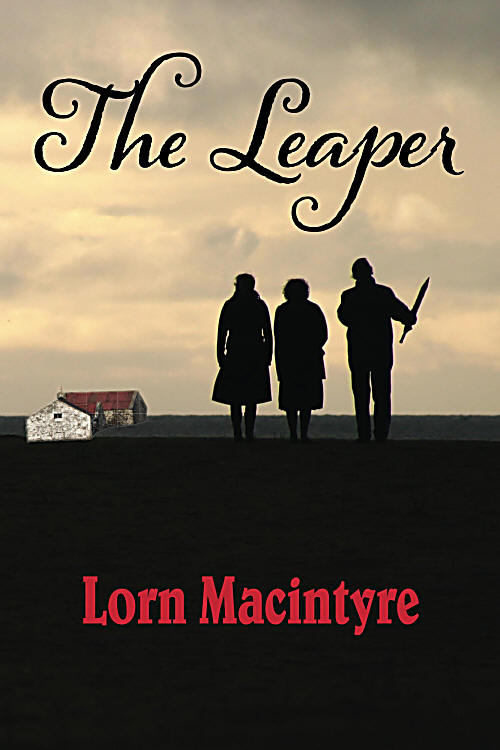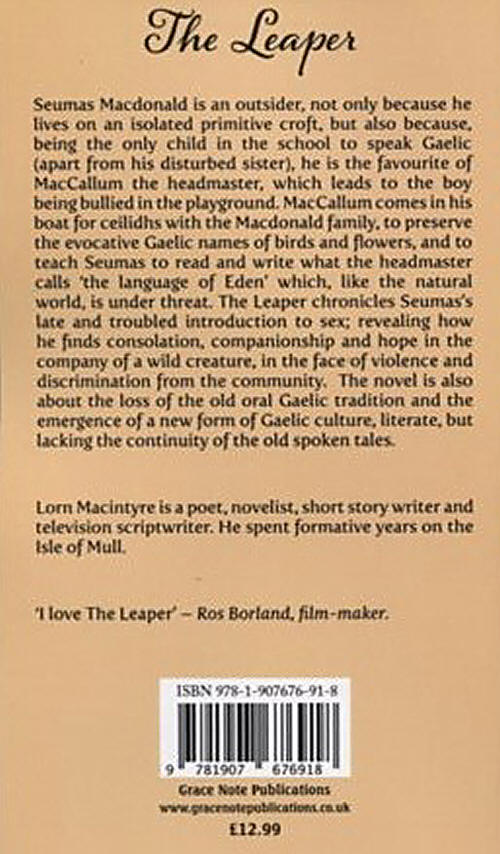Lorn Macintyre was
born in Taynuilt, Argyll, and spent formative years on the Isle of Mull, both
places being the inspiration for his poetry and prose and his exposure to Gaelic
culture. His doctorate on Sir Walter Scott and the Highlands shows how that area
of Scotland was romanticised and misrepresented in literature by ‘the Wizard of
the North,’ with lasting detriment. Lorn is the author of the Chronicles
of Invernevis,
about a Highland landed family, of which four in the series of novels have been
published. He has published two acclaimed collections of short stories based on
his years on Mull and its characters, including his own legendary father Angus,
poet, bank manager and obsessed Gael. His poetry, like his fiction, records and
laments the disappearance of a traditional way of life, with accompanying
decline in the Gaelic language, and the exploitation of the environment, with
some wildlife under threat of extinction through the use of chemicals. Lorn’s
website is at:
http://www.lornmacintyre.co.uk/


First Four Pages of Chapter 1
One
‘Buntŗta’s sgadan.’
The old man had requested potatoes and herring for supper as if the Gaelic feast
were already in his mouth that May day in 1983. Seumas had dug up the big
potatoes he had planted, washing them under the tap in the chipped stone sink in
the scullery. He filled a pot from the sea to cook the herring he had been given
off a boat in the town because you couldn't catch them any more with feathered
hooks off Rubha nan Ron. While supper was cooking on the open flames of the
range he spread the local paper out on the table, then carried the two pots
through to the scullery to drain them, returning to tumble out their contents
into two heaps on the paper before helping the old man to the table.
After his stroke the old man's right arm was like a useless flipper across his
chest. Once the most sure-footed of men, especially in a pitching boat, he now
lurched to the table as if he had a cargo of whisky in him. They sat opposite
each other, using only their hands. The old man picked up a potato, imprinted
with ink from the death notices, breaking it in his fingers and when the steam
had escaped he put a piece into his mouth before peeling the silver skin from
the fish and breaking off a portion.
'Tha seo blasta,' this is tasty, he pronounced.
The old man was wearing an open shirt and trousers with braces, sagging at the
waist, like a clown's outfit, completed by his bulbous red nose. He had
sandshoes without laces on his feet for the comfort of his corns. He wasn't tall
but he had wide shoulders and had been a ferocious fighter in his time, on one
memorable occasion, stripped to the waist in a blizzard, taking on two big men
off a Fleetwood trawler and thrashing them. As his son fondly watched him eating
he smiled at the thought that the old man looked like a seal, with his bald
head, his whiskers, and no neck on the powerful physique. He was eating potatoes
and herring, representing the two toils of his life, the earth and the sea.
There was a little pile of fish skins by his left hand, but he ate the potato
skins, with the dark soil in their crevices. He was laying the fish bones at the
edge of the paper as if engaged in creating an intricate puzzle.
'Tha mi dol don taigh-bheag,' I'm going to the little house, the old man
announced suddenly, hobbling towards the door.
Dileas, faithful, the collie dog, came back alone ten minutes later, whining and
pawing Seumas's foot. He ran round the corner of the house. The old man had
fallen asleep in the stifling taigh-beag, on the plank with the hole in it, his
head on his chest, trousers round his sandshoes, a bluebottle sounding
mournfully in the enamel pail under him.
'Tiugainn,' come along, the son coaxed gently, catching the old man's hand.
The old man pitched forward, his face among the buidheagan an t-samhraidh, the
buttercup, little yellow one of the summer, on the bank of Allt a' Ghobha-Uisge,
the burn of the water ouzel, as it swung behind the house on its way down to the
bay. Seumas knelt, turning the old man over and opening his shirt before putting
his mouth to the old man's white moustache and trying to pump life back into his
chest. Seventy three years of the scent of peat fires were ingrained in his
skin. But the old man was getting cold, and his eyes had rolled up into his head
as if to show that he was finished with the world. The doctor would have to walk
over the hill to tell the son something he already knew, that his athair had
gone, and the undertaker would have to come to measure him, then take the coffin
over the moor on a hired tractor. He couldn't afford it.
He wiped the old man's tÚn
with torn-up newspaper from the rusty nail in the taigh-beag and
carried him on his back, grasping him by the wrists, the sandshoes slithering
through the grass in which the ticking of the grasshopper sounded like a lost
watch. He removed the old man's clothes and sat him naked on the plain wooden
chair in front of the fire, holding him in place with a length of rope wound
round his chest and secured to the chair back. He used the hot water in the
kettle to wash the old man tenderly, as though he were an infant, taking a wet
cloth to the moustache to get the pieces of his last feast of herring out of it.
He thought about shaving him, but it would be difficult, the way his head kept
slumping forward.
Seumas went upstairs and brought down the only suit the old man had possessed
and the white shirt last worn for his wife's funeral, but leaving off the black
tie. He dressed the old man, putting the sandshoes back on his bare feet. He
pulled in the dinghy on the rope and waded out to it with the old man on his
back. He had to take the dog on this final journey because she had been the old
man's and because she adored her dead master, which was why Dileas, whom the old
man claimed understood Gaelic like a human, was whimpering and licking the old
man's ankles.
He transferred the corpse to the launch and laid out the old man between the
seats with one of his creels as a pillow. The old man whose name was Murchadh,
Murdo, had made the creel on the shore in a long-ago summer, bending the steamed
hazel wands over the flat stone for ballast on the board, then plying the big
wooden needle to make the lattice pattern with the twine before brushing on the
pungent pitch from the pot.
Seumas lifted the cover off the engine and jerked the cord, standing at the
tiller as he headed across the bay, round Rubha nan Ron, the Promontory of the
Seals, where the old man had always shot his creels because he said that an iron
ship had gone down there in his grandfather's time and that the holds gave the
lobsters shelter to grow big. The old man and he had worked side by side pulling
up the slimed ropes, talking in Gaelic about other things because it was a
rarity then for a creel not to contain a lobster. Seumas had seen two lobsters
in the one creel, their claws so tangled in combat that the old man couldn't
separate them and had to sacrifice the smaller one.
But the lobsters were small now, and some had dark mottling on their shells
which the buyer wouldn't touch because he said that the top people in the London
restaurants wouldn't pay for blemishes on shellfish delivered whole to their
tables.
The launch with his father's corpse stiffening across the seats, his moustache
dripping with spray, the dog lying beside her master as if her body heat could
bring him back to life, passed the fish farm on the port side, Sgeir nan Eun,
the Skerry of the Birds, to starboard. The town (though it hardly merited the
status, because there were only six hundred inhabitants) was two miles round the
treacherous coast and when the launch puttered to the steps beside the pier he
left the body in it and went into the telephone box, but there was no book to
give him the doctor's number, so he had to phone directory enquiries. The
doctor's receptionist said that he was out on a call.
'Can I take a message?'
'It's Seumas Macdonald here. My father's just died and I brought him round in
the boat.'
The receptionist asked him to repeat what he had just said.
'He's lying in your boat at the pier?' she reiterated incredulously.
'Yes. I brought him round because there's no road to the house for the
undertaker.'
'I think you should phone the police,' the receptionist advised.
'I haven't murdered him.'
Books can be purchased at:
www.gracenotepublications.co.uk and also on Amazon.

